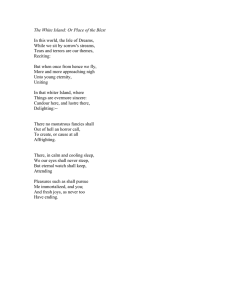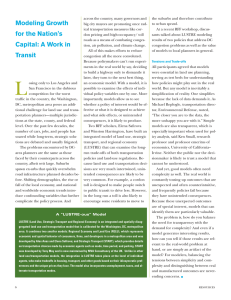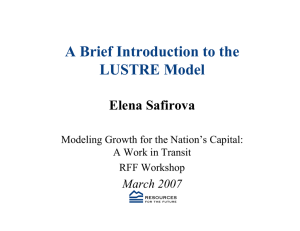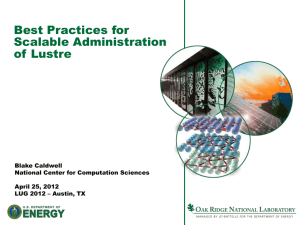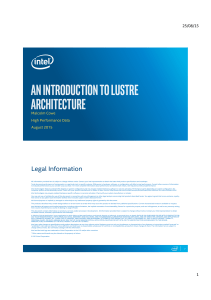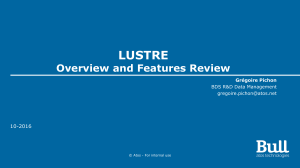Stripe - Lustre
advertisement
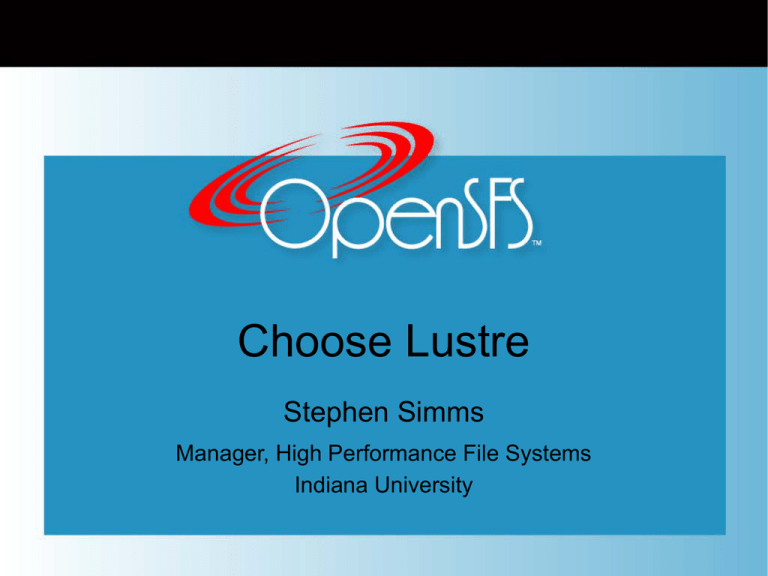
Choose Lustre Stephen Simms Manager, High Performance File Systems Indiana University https://www.flickr.com/photos/kubina/521327318 Lustre is scalable – 55 PB at LLNL http://www.flickr.com/photos/shadowstorm/404158384/ https://www.flickr.com/photos/davesag/18735941 https://www.flickr.com/photos/jackol/874066 Lustre is fast – 1 TB/s at ORNL http://www.flickr.com/photos/dvd5/163647219/ https://www.flickr.com/photos/johngarghan/5688711425 Lustre can support thousands of clients https://www.flickr.com/photos/gogrimm/3525598147 vidiot http://www.flickr.com/photos/vidiot/431357888/ Lustre is Open Lustre is Open source software under GPLv2 That means it’s “Free Like Beer” right? Actually, more like a free puppy… It Takes Lots of Work to Maintain Lustre • • • • • • Bug Fixes Rigorous Testing Feature Development Maintaining Documentation Tree Hosting Code Reviews by Peers Many Hands Make Lighter Work Code Changes for 2.7 from 15 organizations. https://www.flickr.com/photos/alvi2047/3688993279/ Lustre is moving forward • Hiccup when Lustre moved from Oracle • Lustre 2.0 – Fall 2010 • Lustre 2.1 – Fall 2011 • Since then Lustre has accelerated • 2 major releases a year • Spring / Fall • Users following Lustre releases • Majority using 2.5 in production Alright, alright, stop the marketing Lustre = Linux +Cluster Lustre is a parallel distributed file system • High performance filesystem used by >60 of the top 100 supercomputers in the world • POSIX compliant – behaves like other file systems Lustre: The Players MDS metadata server OSS Client object storage server Lustre Architecture - MDS • Metadata Server (MDS) – Node(s) that manage namespace, file creation and layout, and locking. • Directory operations • File open/close • File status • File creation • Map of file object location – Relatively expensive serial atomic transactions to maintain consistency • Metadata Target (MDT) – Block device that stores metadata Lustre Architecture - OSS • Object Storage Server (OSS) – Multiple nodes that manage network requests for file objects on disk. • Object Storage Target (OST) – Block device that stores file objects Simplest Lustre System Lustre Parallel I/O Striping Data • Lustre allows you to control how data is written, if you want – Stripe data across multiple OSTs • can stripe files OR directories – Can increase I/O performance with reading and writing – With DNE2 metadata can be Striped across multiple MDTs • Striping analogous to RAID 0 • Default striping set by sysadmin Striping Example Lustre Striping Advantages Disadvantages Bandwidth – file objects are striped across OSTs, so bandwidth is the aggregate I/O rate User Overhead – Time and thought required to understand your I/O patterns and create stripe layout for directories and files File Size – file objects striped across OST can have a total size larger than available space on any single OST System Overhead – Additional stripes means more OST lookups to determine the size of the file (more time) • Striping will not benefit ALL applications Take Home Message Choose Lustre! It scales – size, speed, clients It’s open, growing, and needs your help It gives users powerful options Tools available to help with installation Filets, Chops, Removes household odors Act now and no salesman will visit your home Thank You for Your Time and Attention Open Scalable File Systems, Inc. 3855 SW 153rd Drive Beaverton, OR 97006 Ph: 503-619-0561 Fax: 503-644-6708 admin@opensfs.org www.opensfs.org Copyright © 2013 OpenSFS.
